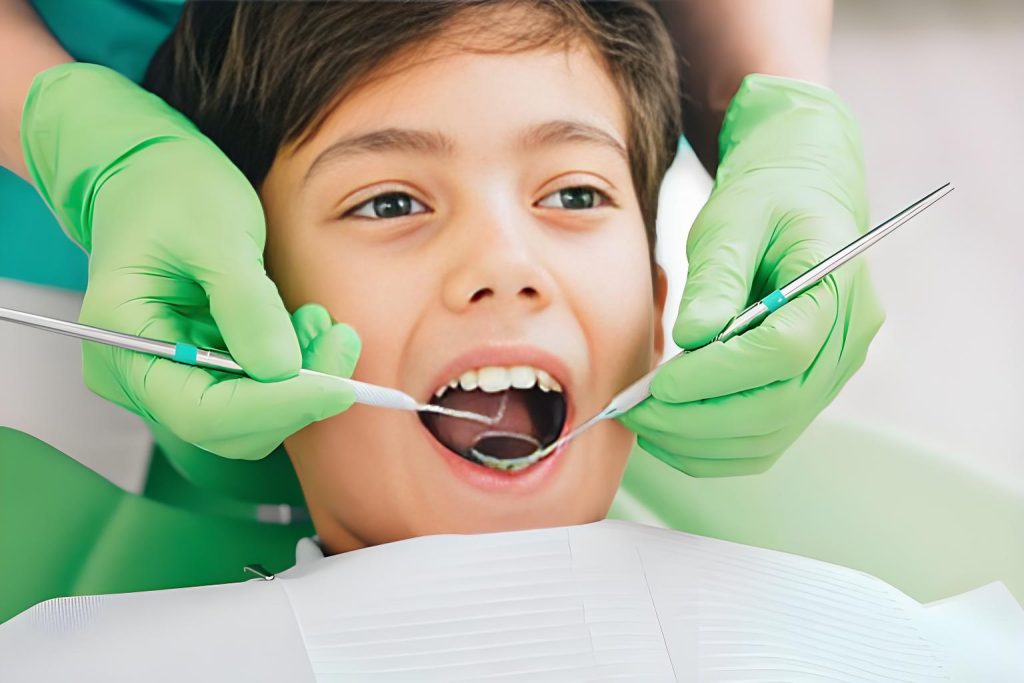In the bustling world of parenting, where schedules are often filled to the brim with extracurricular activities, homework, and family responsibilities, it’s easy to overlook the importance of routine dental check-ups for children. However, these visits are more than just a quick brush and floss session; they are foundational for maintaining long-term oral health and preventing future dental issues. By prioritizing regular dental care from an early age, parents can set their children on a path towards a lifetime of healthy smiles and confidence. This article delves into the myriad benefits of regular dental check-ups for children, the role of early intervention, and practical tips for making these visits a positive experience.

The Early Years: Laying the Groundwork
Children’s oral health journey begins as soon as their first tooth erupts, typically around six months of age. Primary teeth, often referred to as baby teeth, serve not only as placeholders for permanent teeth but also play a crucial role in chewing, speaking, and facial development. Therefore, it’s imperative to schedule the first dental visit within six months of the first tooth appearing or by the child’s first birthday, whichever comes first.
During these initial visits, pediatric dentists or family dentists specializing in children’s oral health perform a comprehensive examination to assess the health of the teeth and gums. They look for early signs of decay, misalignment, and any developmental anomalies. More importantly, these visits provide an opportunity for parents to receive personalized advice on oral hygiene practices tailored to their child’s age and stage of development.
Preventive Care: Catching Problems Before They Start
Regular dental check-ups are pivotal in preventing dental problems before they escalate. Dental sealants, for instance, can be applied to the chewing surfaces of molars to protect them from cavities. Fluoride treatments, another preventive measure, strengthen tooth enamel, making it more resistant to decay.
Moreover, professional cleanings remove plaque and tartar buildup that brushing and flossing at home may miss. This thorough cleaning helps prevent gingivitis, an inflammation of the gums caused by plaque accumulation, and sets a strong foundation for good oral hygiene habits.
Early Detection: The Key to Successful Treatment
One of the most significant advantages of routine dental check-ups is early detection of potential problems. Cavities, gum disease, and orthodontic issues can be identified and addressed promptly, often leading to more conservative and less invasive treatments. For instance, early intervention for cavities can often be managed with simple fillings rather than more extensive procedures like crowns or extractions.
Similarly, orthodontic evaluations during childhood can identify alignment issues that may benefit from early treatment. Interceptive orthodontics, which involves early intervention to correct problems as they arise, can prevent more complex issues later in life and improve the overall function and aesthetics of the smile.
Beyond the Teeth: Addressing Overall Health
Regular dental check-ups are not just about teeth; they are a window into your child’s overall health. Dental health is intricately linked to systemic health. Conditions like diabetes, heart disease, and respiratory infections can manifest or be exacerbated by poor oral hygiene. Conversely, good oral health can positively impact overall wellbeing.
For instance, gum disease, known as periodontal disease, has been linked to systemic inflammation, which can contribute to a range of health issues. By maintaining good oral hygiene and attending regular dental check-ups, parents can help mitigate these risks and support their child’s holistic health.
Positive Dental Experiences: Building Trust and Confidence
Regular dental visits also play a critical role in shaping children’s attitudes towards dental care. Positive experiences from early on can foster a lifelong appreciation for oral health and instill a sense of trust in dental professionals. Conversely, negative experiences can lead to dental anxiety or fear, making future visits challenging.
Pediatric dentists are trained to create a welcoming and child-friendly environment. They use age-appropriate language, incorporate fun elements like stickers or toys, and offer gentle, patient-centered care. By making dental visits a positive experience, parents can help their children develop a healthy relationship with dental professionals, setting the stage for future cooperation and compliance.
Practical Tips for Making Dental Visits a Success
- Start Early: As mentioned, scheduling the first dental visit early helps normalize dental care and establishes a routine.
- Read Books and Watch Videos: Children’s books and educational videos about dental visits can help demystify the experience and alleviate fears.
- Use Positive Reinforcement: Praise your child for good behavior during and after dental visits. Small rewards can reinforce positive associations.
- Be a Role Model: Demonstrate good oral hygiene practices at home and show enthusiasm for your own dental check-ups.
- Open Communication: Encourage your child to share any concerns or questions they have about dental visits. Addressing these fears openly can help alleviate anxiety.
- Find a Pediatric Dentist: Pediatric dentists specialize in children’s oral health and are trained to create a comfortable, child-friendly environment.
Conclusion: Investing in a Lifetime of Smiles
Regular dental check-ups for children are an investment in their future health and wellbeing. They provide a platform for preventive care, early detection and treatment of problems, and the fostering of positive dental attitudes. By prioritizing these visits, parents can empower their children with the knowledge and tools needed to maintain healthy smiles throughout their lives.
Remember, a healthy mouth is a gateway to better overall health, and the habits formed in childhood can have lasting impacts. So, let’s make dental check-ups a cherished part of our children’s healthcare routine, paving the way for a lifetime of confident, healthy smiles.













































Discussion about this post